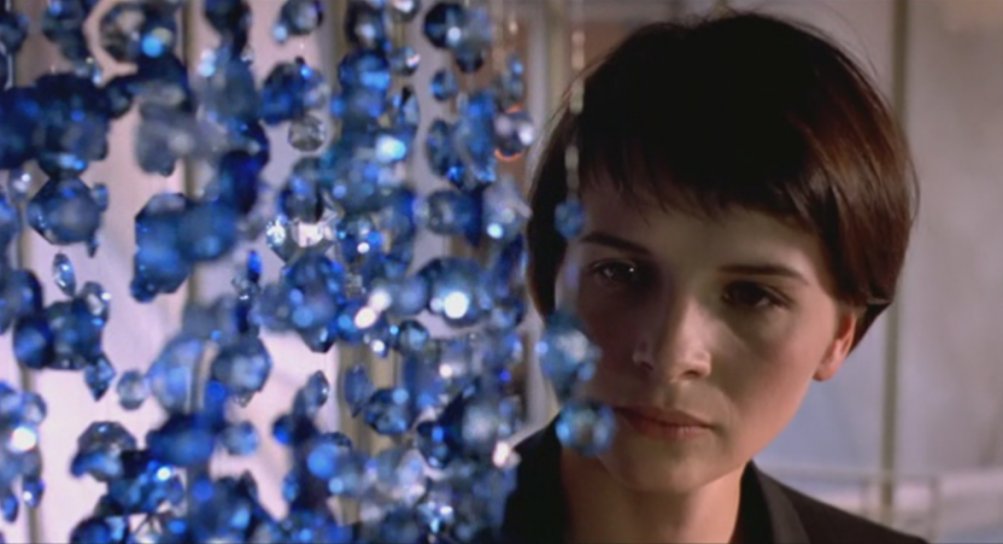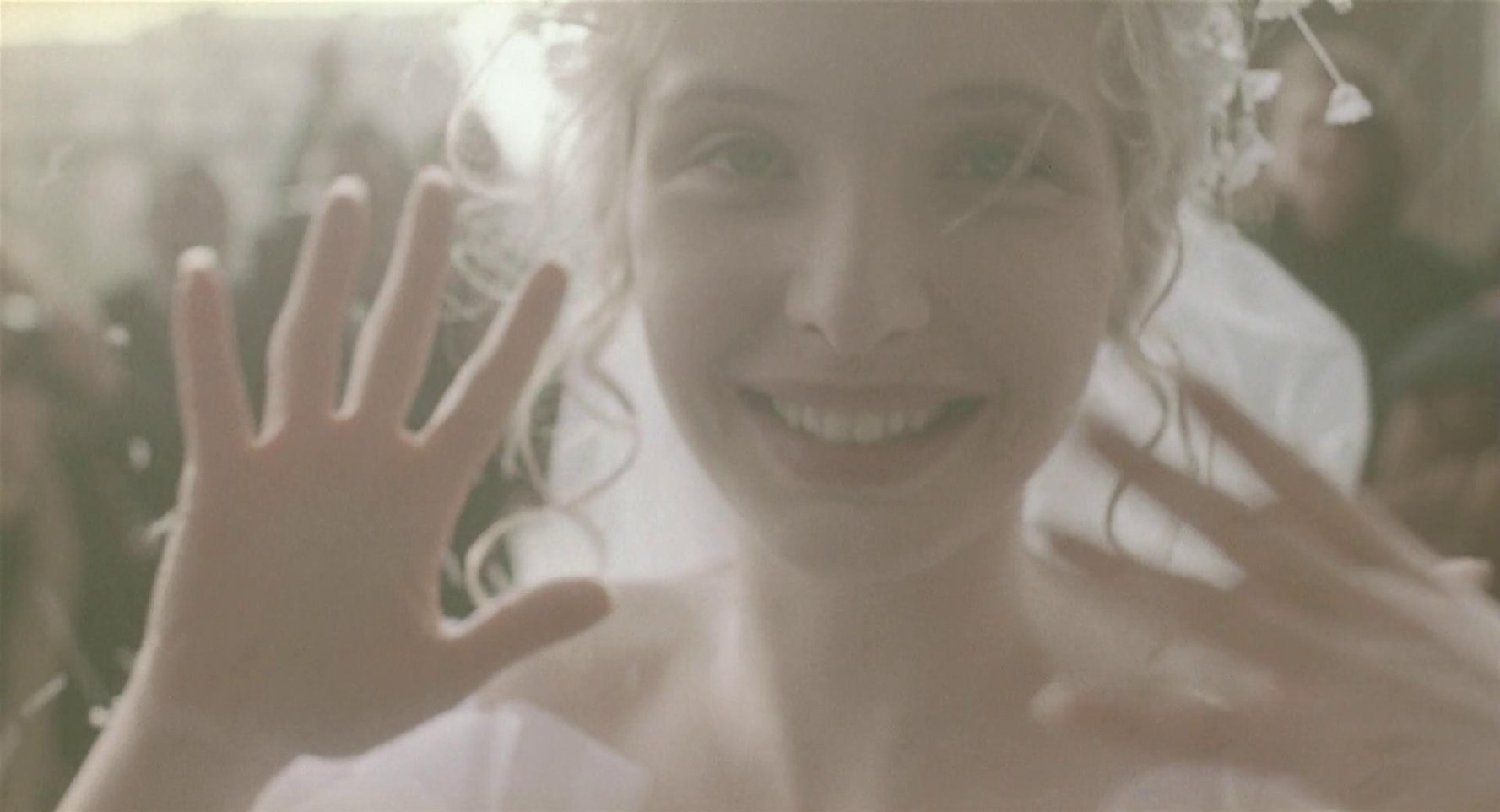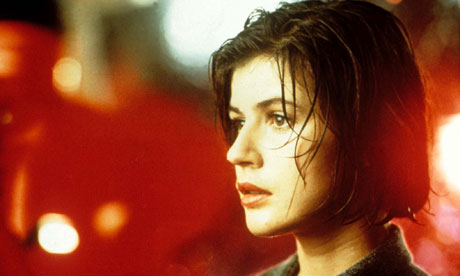Blue (1993)

Blue is the hardest film of the three to watch and the easiest to write about. Julie loses her composer husband and daughter is a car accident and is too injured to even attend the funeral. After a feeble suicide attempt, she withdraws for her life, avoiding reporters and ignoring her husband's unfinished work. People are understandably worried - the symphony was to be played at twelve locations simultaneously to represent the unification of Europe. That's not exactly something you can start from scratch. She doesn't care and even destroys her only copy of their work.
Music is a huge part of the movie. Every time Julie is hit with emotion, the music from the symphony comes up. She is cleary quite musically talented herself and likely had a large part creating it. She contacts one of her husband's old friend and fulfills his longtime unspoken wish, and then tells him that "you won't miss me now." All business complete, she abandons her home and sells most of her family possessions. She wants no reminders of the life that she lost.
She moves to a quiet apartment building away from children. She has kept enough to survive without working and seems content passing the time eating ice cream mixed with coffee. When she visits her mother, clearly in the late stages of Alzheimer's, the older woman cannot remember who she is or the loss Julie has just suffered. Her old friend tracks her down but doesn't want anything. And she picks up a new friend, Lucille, by trying not to get involved in her eviction. Lucille is grateful and really chatty, asking the kind of questions Julie really wants to avoid.
When her old friend shows up on television, she not only finds out he will finish the symphony but that her husband had a long-time mistress. (Strange that she would find that out on television.) She discovers that her husband's work was copied before she destroyed it because it was too important to lose. After agreeing to finish the symphony, she asks about the mistress and wants the opportunity to meet her. The mistress isn't hard to find and doesn't bother denying it when Julie confronts her. She is very pregnant and doesn't want Julie to hate her or the child. In her usual manner, Julie is not cruel or kind in their conversation. She's cold, as if the woman isn't worth hating. And yet, she doesn't leave it there.
As expected, the color blue is omni-present in the film. From her daughter's crystals, the background filters, and the pool in which Julie frequently swims. The final montage wraps up the shows the main characters and a few we met along the way. And Julie is finally able to start mourning her husband and daughter. That's as close to a happy ending as you're going to get with Kieslowski.
I don't think there's much argument that Juliette Binoche gives the best performance in the trilogy. Julie Delpy has too little screen time in White and Irene Jacob isn't given much to do in Red except look pretty. Still, Blue is more than a one-woman show. It's a visual and audio treat that tells an engaging story without manipulation. Grief is a universal language.
White (1994)

The second film in the series is not a sequel to Blue. Both are set in Paris and have overlapping timelines. Karol is a Polish hairdresser who is being divorced by his young French wife. She offers a few reasons: he doesn't speak French, he can't satisfy her needs, and maybe she's just bored with him. After the divorce is final, she goes to great lengths to torment him. She cuts off all access to his money. And when he makes one final attempt to reconcile, she humilates him and then burns down her own shop so he will be wanted by the police. Her cruelty borders on pathological.
Karol needs to get out of Paris and does not have any means to do so. He meets a fellow Pole who offers to help. They devise a plan where Karol, a grown man about average size, will travel in a suitcase that Mikolaj will check in. Even in pre 9/11 days, this is a hard sell. Most likely he would have broken his neck during travel. In any case it works and he gets back to his brother and his old life. However, he certainly hasn't forgotten Dominique.
Finding work in Poland is not a problem, but he wants to get ahead of the game quickly. That involves working with some dangerous people in activities that aren't entirely legal. He works his way into a crime syndicate as a security guard to find out about their deals. He then looks for ways to interfere with their plans so they have to buy him off. Somehow he manages not to get killed in the process. And he gets more funding by completing an unpleasant job for a man who wants to end his life. Karol doesn't do what was requested, but what was necessary. All this leads to him being a successful businessman with only a hairdresser's training. Not bad. Dominque has to change her mind now, right?
We don't see much of Dominique after the divorce. There are a few shots establishing that her new Paris life is a disappointment. Meanwhile, Karol still loves her and learns French to speak to her. It doesn't matter. She still won't talk to him. He then goes to great lengths to bring her to Poland. While his motivations are spoiled on the movie's poster (labeling it a revenge flick), there are still questions. Will he go through be it? How badly does he want her to suffer? Won't he hurt himself just as much with his scheme? And most importantly, why do these two people who were clearly in love go to such extraordinary lengths to hurt each other? The glib response is they deserve each other. Kieslowski encourages deeper contemplation.
White is my favorite of the trilogy for a few reasons. It has the most conventional plot-driven story. It has more comedic moments as well as one of the most dramatic when a character believes he has been shot. Neither main character is sympathetic, yet we still care about what happens to them. Karol had a successful new life but couldn't let go of his past. When anger becomes the driving force in one's life, the result is never good. And yet every new generation has to learn this lesson for itself.
Red (1994)

The much anticipated finale did not disappoint. Set in Geneva, Switzerland, we follow the life of an attractive model with a grueling schedule. Valentine always seems to be on her way to a modeling shoot or a dance class. She makes a habit of playing a slot machine daily and hoping to lose - willing to pay to keep her good luck. When she wins, she dreads her upcoming bad fortune. And she has an absent, yet controlling boyfriend whose phone calls border on abusive. For the time being, her life seesm to be on track.
When she backs into Rita, a German Shepherd, her conscience obligates her to find the pet's owner. She goes to the house on Rita's tag and meets a retied judge who doesn't seem concerned about anything. He brushes off her questions and offers to let her keep Rita. She takes Rita to the vet, but as soon as the dog feels better she goes straight back to the judge. Valentine is relieved, as she couldn't keep the dog in her small apartment anyway.
Meanwhile, the judge sends her money for the vet, which is odd because she never even told him her name. She returns to give back the excess and then discovers that the judge is spying on his neighbor's phone calls. It's never clear why he does this - most of the conversations are not that interesting. He has no interest in intervening in anyones lives. Valentine is horrified, but freezes when given a chance to do something about it. She leaves him in disgust with no intention of returning. Yet we know they will meet again. And the judge makes sure of it with his next action, which is entirely unexpected.
There is a parallel story about a law student Augustin who lives in a building across the street. He is studying to take a bar exam and is dating a local girl who gives weather reports on the phone. His life seems to be going great after he passes the bar exam, but circumstances change quickly. He also seems to be on a collision course with Valentine's as they are often in the same place but have not met.
Red really hits its stride after the final fashion show. Valentine and the judge are alone in an empty auditorium and a storm is on the way. They finally lay their cards on the table - the judge about his disappointments in life and Valentine about her insecurities. She despairs that she cannot help her younger brother and suspects that something big is happening all around her. The judge can sense this too. The relevance of the law student becomes clear as well. Kieslowski sure loved playing with timelines. The storm becomes to focal point that ties up the entire series.
I slightly prefer both Blue and White to Red, but that's just a personal preference. Red is certainly the best-looking of the series, earning Oscar nomination for Best Cinematography and Best Director. Cinematography is usually better appreciated on the large screen. Kieslowski retired soon after the trilogy was complete and died a few years after. It was suspected that he knew he was ill and ths would be his last work of a long career. It's a fitting tribute.